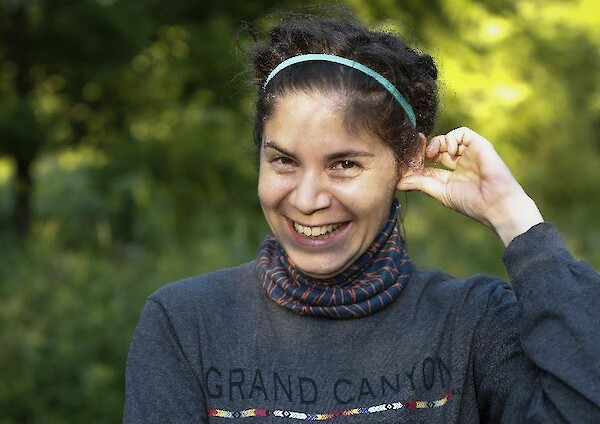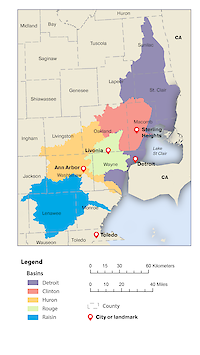Welcome, Lorena!

Lorena is the new Project Manager with IAN in Annapolis, Maryland. She got her degree in Biology from the National Autonomous University of Mexico (UNAM), her M.Sc. from the University of Edinburgh, and her Ph.D. in Botany and Plant Sciences from the University of California Riverside. In 2020 she was an AAAS Mass Media Fellow writing for the Indianapolis Star and has experience in public outreach and writing for outlets in the U.S. and Mexico. She was academic editor for Botany One, a blog about plant research run by the Annals of Botany Company. Lorena joins IAN’s team to help produce report cards for the Clinton, Detroit, Huron, River Raisin, and Rouge Rivers and will work with Dr. Andrew Elmore to coordinate the recently created research network known as Landscape Exchange Network for Socio-environmental systems (LENS). Lorena enjoys running, photographing plants and annotating them to share cool plant facts on social media.
The Start of Socio-Environmental Report Cards for Southeast Michigan

Three virtual workshop sessions for the development of socio-environmental report cards for the Detroit, Clinton, Huron, Rouge, and Raisin rivers in Michigan occurred November 2021. The main goal of the workshop was for stakeholders to identify indicators that reflect the social, cultural, economic, and environmental values of the Southeast Michigan region. IAN is partnering with Council Fire, LLC, the Erb Family Foundation, The Clinton River Watershed Council, Friends of the Detroit River, Huron River Watershed Council, River Raisin Watershed Council, and Friends of the Rouge, to create socio-environmental report cards for five rivers, and a report card that integrates the results into an assessment of the Southeast Michigan region.
Coming up: LENS workshop

The Landscape Exchange Network for Socio-environmental systems (LENS) will have its first workshop in May. LENS is an NSF Research Coordination Network that hopes to support research that integrates the high-resolution remotely sensed data from the NEON Aerial Observation Platform to address socio-environmental research questions. If you want to learn more about LENS visit our website and consider subscribing to our newsletter.
The first LENS workshop will be held at SESYNC in Annapolis, MD, USA from 4–6 May 2022.vRegistration is now closed, but we’ll be posting parts of the event to our website. The workshop will allow participants to take a deep dive into translational ecology, identify data and methods relevant to socio-environmental systems, all while networking and sharing their passion for the interaction between the natural and social worlds.
1st LENS workshop

The Landscape Exchange Network for Socio-environmental systems (LENS) had its first workshop May 4–6 at the National Socio-Environmental Synthesis Center (SESYNC) in Annapolis, Maryland. This is the first in-person workshop hosted by the Integration and Application Network since the pandemic started, although some joined us virtually for the presentations.
On the first day of the meeting, participants from various institutions across the U.S. visited a stream restoration project and a managed field within the National Ecological Observatory Network (NEON) Airborne Observation Platform (AOP) site at the Smithsonian Environmental Research Center (SERC). Back at SESYNC, participants heard from various speakers and took part in breakout sessions to discuss translational ecology approaches, identify data and methods relevant to socio-environmental systems, and to discuss the future of LENS. Having only met virtually for the past two years, the kitchen at SESYNC bubbled with conversation as participants had coffee and shared their passion for the interaction between the natural and social systems. Parts of the event will be posted to the LENS website. LENS is an NSF Research Coordination Network that hopes to support research that integrates the high-resolution remotely sensed data from the NEON AOP to address socio-environmental research questions. If you want to learn more about LENS visit our website and consider subscribing to our newsletter.
Coral Reef Report Card workshop during the XI Mexican Coral Reef Congress and II PanAmerican Coral Reef Congress

A Coral Reef Report Card workshop was held on September 27th in Veracruz, Mexico as part of the activities of the XI Mexican Coral Reef Congress and II PanAmerican Coral Reef Congress. While in 2019 the Harte Research Institute for Gulf Mexico Studies (HRI) and UNAM-Sisal released a preliminary report card, the goal now is to develop a tri-national quantitative coral reef assessment for the whole Gulf of Mexico.
To highlight the work already done in the region, the workshop included short presentations of report cards developed in Mexico, the U.S., and Cuba. In 2021 in Mexico, Sea&Reef and local partners released a report card for the reefs in the state of Veracruz, while LANRESC, HRI and UNAM-Sisal produced the Alacranes Reef National Park report card for the Yucatán area. In the U.S., HRI developed the first Texas Ecosystem Health Report Card in 2019 and is now working on updates; NOAA and IAN published the Coral Reef Ecosystem Status Reports in 2020, including the Flower Garden Banks and Florida Keys reefs in the northern gulf. Cuba’s report card is hot off the press and will soon be available.
This workshop was special in that rarely people from the U.S., Mexico, and Cuba can engage in in-person discussions. Around 30 participants from universities and government agencies brainstormed ideas on common and shared coral reef socio-ecological indicators and funding options.
Overall, this was a great opportunity to continue building and strengthening a community of practitioners within the Gulf of Mexico region.

